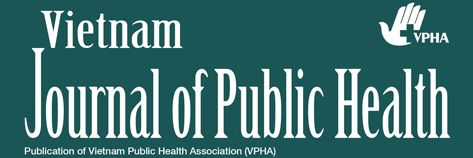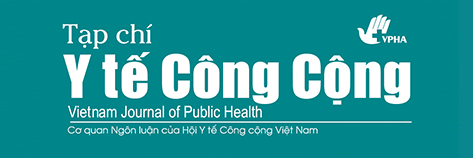Thực trạng năng lực sức khỏe của một số nhóm dân cư tại Chí Linh, Hải Dương và Hà Nội, Việt Nam (Health literacy: Among some groups of Vietnamese)
Tóm tắt
Năng lực sức khỏe là một khái niệm mới trên thế giới. Tại Việt Nam đến nay chưa có nghiên cứu nào liên quan đến lĩnh vực này. Nghiên cứu này có mục tiêu bước đầu tìm hiểu về năng lực sức khỏe của một số nhóm đối tượng Việt Nam. Thiết kế nghiên cứu mô tả cắt ngang tiến hành năm 2014, với 966 đối tượng là người dân sinh sống tại Chí Linh, Hải Dương và sinh viên 3 trường đại học tại Hà Nội. Bộ câu hỏi về năng lực sức khỏe của Châu Á (HLS-Asia) được chuẩn hóa trước khi tiến hành phát vấn cho đối tượng. Kết quả cho thấy 67,9% đối tượng nói chung thiếu về năng lực sức khỏe. Các yếu tố có liên quan với năng lực sức khỏe là yếu tố vùng miền, trình độ học vấn, trình trạng kinh tế và tiếp cận thông tin y học của đối tượng. Để nâng cao năng lực sức khỏe của đối tượng cần có thêm những bằng chứng định lượng và định tính về từng lĩnh vực trong năng lực sức khỏe.
English abstract
The health literacy is a new concept in the world and in Vietnam so far no studies regarding this field. The study aims to bring out the first picture of health literacy on Vietnamese, give recommendation for further research. The cross-sectional survey was conducted with the participation of 966 people at Chi Linh, Hai Duong and 3 universities in Hanoi in 2014. The questionnaire tool with scales HLS-Asia is validated and used. Results showed that 67.9% of people lack of health litaracy. In addition, the factors affacting health literacy were regions, education levels, economic status and access to medical information by using linear regression analysis statistic. To enhance health literacy in Vietnam the more quantitative and qualitative studies should be conducted to better understanding of HL general and on each domains.
Từ khóa
Toàn văn:
PDF (English)##submission.citations##
Tài liệu tiếng Anh
Kristine Sørensen, Stephan Van den Broucke, James Fullam, Gerardine Doyle, Jürgen Pelikan, Zofia Slonska, et al, Health literacy and public health: A systematic review and integration of definitions and models, BMC Public Health, 2012;12(80), English,
Health Literacy in Canada: A Healthy Understanding 2008, Ottawa: Canadian Council on Learning, 2008,
Kutner, M, Greenberg, E, Jin, Y, C P, The Health Literacy of America’s Adults: Results From the 2003 National Assessment of Adult Literacy (NCES 2006–483): Washington, DC: National Center for Education Statistics; 2006,
HLS-EU Consortium, Comparative report of Health literacy in eight EU member states, The European health literacy survey HLS-EU (Second revised and Extended version), 2012,
Shoou-Yih D Lee, Tzu-I Tsai, Yi-Wen Tsai, Kuo KN, Health literacy, health status, and healthcare utilization of Taiwanese adults: results from a national survey, BMC Public Health, 2010;10,
Yasuharu Tokuda, Nobutaka Doba, James P, Butler, Michael K, Paasche-Orlow, Health literacy and physical and psychological wellbeing in Japanese adults, Patient Educ Couns, 2009;75:411-7.
Baker D, Wolf M, Feinglass J, Thompson J, Gazmararian J, Huang J. Health Literacy and Mortality Among Elderly Persons. Arch Intern Med. 2007;167(14):1503-9.
Weiss BD, Palmer R. Relationship between health care costs and very low literacy skills in a medically needy and indigent Medicaid population. J Am Board Fam Pract. 2004;17(1):44-7.



